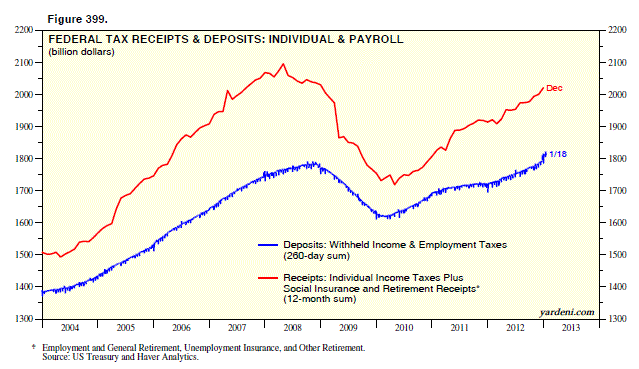 |
The payroll tax paid by workers increased from 4.2% to 6.2% at the start of the year. It was temporarily cut back in 2010 to stimulate consumer spending. The regressive tax is paid by everybody who earns $113,700 annually or less. That means someone making the median income of about $50,000 will pay $1,000 a year more in taxes, or a little more than $19 a week. These receipts are supposed to pay for Social Security and Medicare, but they are actually spent along with all other revenues.
I monitor the 260-day moving sum of withheld income and employment taxes deposited at the US Treasury. It was $1,791 billion on December 18. It jumped $25 billion to $1,816 billion on January 18. That’s a significant tax increase, especially if it is annualized, that could depress real GDP at least during the first quarter. The Treasury’s monthly data show that individual income taxes totaled $1,174 billion last year, while payroll taxes totaled $847 billion. Both increased last year along with payrolls. Of course, the good news at the start of this year was that Congress voted to make the Bush tax cuts permanent for 98% of American taxpayers. That was offset by the bad news about the higher payroll tax rate. That would certainly explain why the Consumer Sentiment Index (CSI) slipped in January to the lowest reading since December 2011. Joining the recent downdraft in the overall CSI was its present situation component, which had risen to a cyclical high during November. Today's Morning Briefing: Going Vertical. (1) Climbing the Wall of Worry (WOW). (2) Living less dangerously this year? (3) There’s still a worry list. (4) Fiscal drag is a drag in US. (5) Will Draghi’s stealth bomber work in Cyprus? (6) Running out of warm and able bodies in China. (7) It’s getting hard to breathe in China. (8) Distracting the masses with xenophobic nationalism. (9) Yet many stocks are soaring, including many of our favorites. (More for subscribers.) |
Tuesday, January 22, 2013
Fiscal Drag
Subscribe to:
Post Comments (Atom)


No comments:
Post a Comment